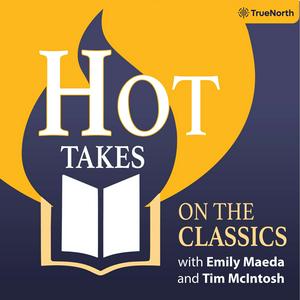Description
In this episode of Hot Takes on the Classics, Tim McIntosh and Emily Maeda explore The Temple by George Herbert, one of the most profound devotional poetry collections in the English language. Through close readings of Herbert’s poems and reflections on his life, suffering, and vocation, the hosts examine how Herbert uses poetic form, architectural structure, and startling imagery to express the depths of divine love. Along the way, they reflect on the experience of reading poetry slowly and attentively, the relationship between affliction and grace, and why Herbert continues to shape poets, theologians, and readers centuries later.
Episode Outline
Opening reading of George Herbert’s poem “Bitter-sweet”
Emily’s personal encounter with Herbert through Christine Perrin’s lecture at The CiRCE National Conference
Poetry as an experiential art: reading collections versus isolated poems
Comparing poetry collections to listening to a full album
Discussion of poetry collections by Rainer Maria Rilke, T.S. Eliot, and R.S. Thomas
George Herbert’s life: education, illness, vocation, and pastoral ministry
Herbert’s relationship to John Donne and the metaphysical poets
The Country Parson as Herbert’s only work published during his lifetime
The posthumous publication and reception of The Temple
Structural “architecture” of The Temple: Church Porch, The Church, The Church Militant
Close readings and discussion of poems from The Temple, including “The Glance,” “The Agony,” “Virtue,” “The Wreath,” and “Love (III)”.
Herbert’s use of poetic form (visual poems, repetition, symmetry)
Reflections from T.S. Eliot, W.H. Auden, Elizabeth Bishop, and Simone Weil
Poetry as the proper language for suffering and divine love
Closing reflections on poetry, attention, and formation
Key Topics & Takeaways
Poetry as Formation: Herbert’s poetry resists abstraction and demands patient attention, shaping the reader through image, rhythm, and form rather than argument.
Affliction and Divine Love: Herbert presents suffering not as a contradiction of God’s love but as one of its deepest avenues, especially in poems like “The Agony” and “Love (III).”
Architectural Meaning: The Temple is structured like a sacred space—moving inward, upward, and through the stages of the Christian life.
Form Serves Meaning: Herbert’s experimental poetic forms (wreaths, wings, typographic play) embody theological truth rather than merely decorate it.
Enduring Influence: Herbert’s work continues to shape modern poets, theologians, and seekers across belief traditions.
Questions & Discussion
Why does reading poetry slowly matter?
Consider how reading an entire poetry collection—rather than isolated poems—changes interpretation and emotional impact.
How does Herbert connect suffering and love?
Reflect on how poems like “The Agony” and “Love (III)” portray pain as a vehicle for grace rather than its opposite.
What does Herbert gain by using poetic form visually?
Discuss how poems like “The Wreath” or “Easter Wings” communicate meaning through structure, not just words.
Can poetry communicate theological truth better than prose?
Think about why figures like Erik Varden argue that poetry is uniquely suited to expressing spiritual realities.
Why does “Love (III)” remain so powerful for readers today?
Reflect on its depiction of divine hospitality, shame, and acceptance, and why it continues to resonate across centuries.
Suggested Reading
The Temple by George Herbert
The Poems of George Hebert by George Herbert
The Country Parson by George Herbert
Confessions by St. Augustine translated by Sarah Ruden
Holy Sonnets by John Donne
Duino Elegies by Rainer Maria Rilke
Four Quartets by T.S. Eliot
R.S. Thomas: Everyman Poetry by R.S. Thomas
Waiting for God by Simone Weil
Healing Wounds by Bishop Erik Varden
Chastity: The Reconciliation of Senses by Bishop Erik Varden


